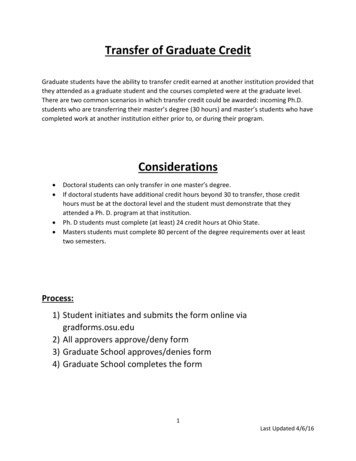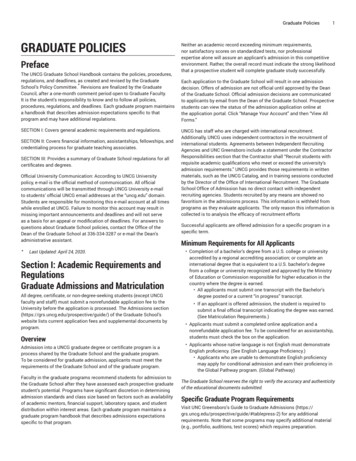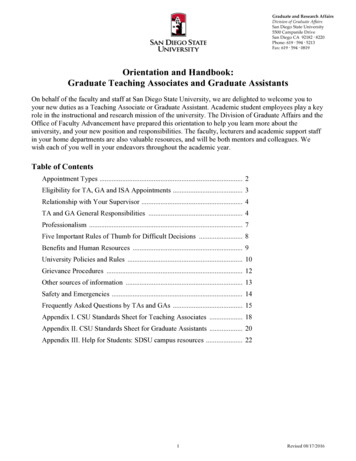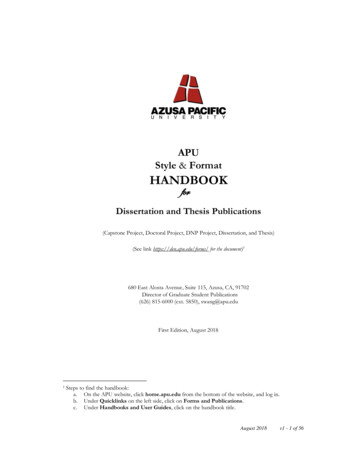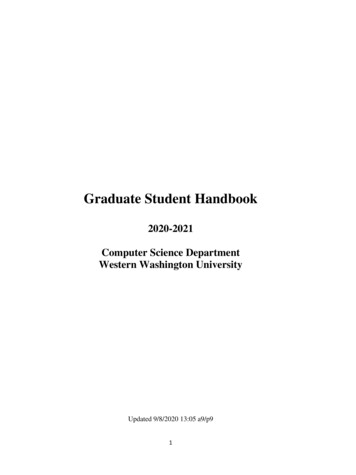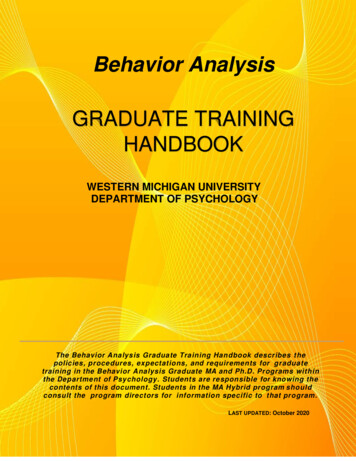
Transcription
Behavior AnalysisGRADUATE TRAININGHANDBOOKWESTERN MICHIGAN UNIVERSITYDEPARTMENT OF PSYCHOLOGYThe Behavior Analysis Graduate Training Handbook describes t hepolicies, procedures, expectations, and requirements for graduatetraining in the Behavior Analysis Graduate MA and Ph.D. Programs withinthe Department of Psychology. Students are responsible for knowing thecontents of this document. Students in the MA Hybrid program shouldconsult the program directors for information specific to that program.LAST UPDATED: October 20201
TABLE OF CONTENTSPROGRAM DESCRIPTION AND TRAINING MODEL .4PROGRAM GOALS .5ADMISSION TO THE BEHAVIOR ANALYSIS GRADUATE PROGRAMS. 6PROGRAM FACULTY .9GENERAL PROGRAM REQUIREMENTS.10COURSE TRANSFER AND SUBSTITUTION.11M.A. REQUIREMENTS .12MASTER’S THESIS/PROJECT .15PH.D. REQUIREMENTS .19COMPREHENSIVE EXAMINATION OR EQUIVALENT ACTIVITY .24DOCTORAL DISSERTATION .27RESEARCH ETHICS REQUIREMENTS.29CHECKLIST FOR THESES/PROJECTS AND DISSERTATIONS .30PROGRAM EVALUATION AND FEEDBACK .32LICENSURE .33FUNDING.34ANNUAL STUDENT EVALUATION.35STANDARDS OF PROFESSIONAL CONDUCT .36ACADEMIC INTEGRITY .37GROUNDS FOR DISMISSAL FROM THE PROGRAM.38MICHIGAN RESIDENCY STATUS.40UNIVERSITY REQUIREMENTS.41APPENDIX (LINKS) .442
PROGRAM DESCRIPTION AND TRAINING MODELMISSION; The Behavior Analysis (BA) graduate programs provide intense training in the conceptual, basic,and applied foundations of behavior analysis. In addition to giving students substantial training in a corespecialty area (e.g., autism and developmental disabilities, health or safety, behavioral pharmacology,experimental analysis of behavior, or behavioral neuroscience), the program exposes students to a broadrange of applied and experimental areas through coursework, research, and applied experiences.The program offers two graduate degrees: a Master of Arts (MA) in both traditional on-campus and hybridcurriculum sequences, and a Philosophy of Science (Ph.D.) in Behavior Analysis. The curriculum is designedso that degree completion falls within as a 2-3 (MA) and 4-5 (Ph.D.) year time frame.The MA program prepares students for doctoral study or employment at the MA level in developmentaldisabilities, mental health, substance abuse, education, government, and business and industry. The Doctor ofPhilosophy (Ph.D.) program prepares students for roles as professors and researchers in college or universitysettings, researchers in government or business settings, or systems-oriented applied positions in the humanservices.The programs include training in basic principles of behavior, behavior-analytic theory, research methodology,applied behavior analysis, and ethics, and offers specialized training in other areas such as behavioralneuroscience and behavioral pharmacology.Students in the MA program are admitted either under a Thesis option, or a Project option. The Project optionis for students who aim to become practitioners. Students interested in becoming practitioners for the treatmentof autism and developmental disabilities can choose between our on-campus MA program or our hybrid MAprogram.On campus programs are accredited by the Behavior Analysis Accreditation Board (“BAAB”) of the Associationfor Behavior Analysis International (“ABAI”) to award Master of Arts in Behavior Analysis and Doctor ofPhilosophy in Behavior Analysis.The MA program consists of a verified course sequence (VCS) approved by the Association for BehaviorAnalysis International (ABAI) which prepares students to sit for the exam to become a Board Certified BehaviorAnalyst (BCBA). Students in the MA program also complete the necessary practicum training as part of thecurriculum.3
PROGRAM GOALS AND TRAINING MODELThe Program's core goals and related objectives are as follows:1. Provide comprehensive training in behavior analysis that will serve as a basis for specialized trainingduring later years of graduate or post-doctoral study.a. Students will develop a strong knowledge-base of conceptual, theoretical, and applied issues inbehavior analysisb. Students will develop knowledge of scientifically supported behavioral applications relevant to avariety of applied problems.c. Students will develop knowledge of research methods, which includes at the Ph.D. level, statisticalanalysis2. Establish professionalism and ethicality.a. Students will understand and commit to the APA, ABAI, and relevant BACB ethical codesb. Across professional contexts students' appearance, language, and conduct will be marked byintegrity, accountability, and ethicality3. Instill in students a professional identity that fosters lifelong learning and engagement in the broaderbehavior-analytic and psychological community.a. Students will pursue professional development via participation in regional, national, or internationalorganizations as membersb. Students will pursue professional development by attending and participating in conferences,workshops, colloquium, and professional trainings4. Instill in students an awareness and openness toward individual and cultural diversity.a. Students will acquire knowledge of individual differences and cultural diversityb. Students will demonstrate a respect for and ability to work with diverse individualc. Students in applied areas will be aware of the impact of him/herself on clients5. Establish in students the skill set to consume and conduct empirical research.a. Students will be nested in an active research community with an identified mentorb. Students will demonstrate knowledge of and behave in accord with human subjects and animalsubject protectionsc. Students will seek individualized experiences in research methods and experimental design issuesrelevant to their research interestsd. Students will demonstrate an ability to comprehensively evaluate a substantive area of the researchliteraturee. Students will demonstrate an ability to review the strengths and weaknesses of the scientificliterature in a targeted domain, link that review to an applicable research question, and develop aresearch design to provide information relevant to answering that questionf. Students will demonstrate an ability to analyze and integrate the research findings into the broaderscientific literature in a relevant domain6. Students seeking certification by the Behavior Analyst Certification Board (BACB) to become a BoardCertified Behavior Analyst (BCBA) will obtain the necessary preparations to apply for certification andsuccessfully pass the BACB examination.a. Students seeking BACB certification will take courses in the VCS to acquire the applied andprofessional skills designated by the BACB task list.b. Students seeking BACB certification will learn the skills necessary to function effectively in aspecialized service setting during external practicum7. Students will have the ability to orally communicate their research and applied projects in professionalsettings.a. Applied students will be able to orally present case materials in a concise, organized, andcomprehensive wayb. Students will be able to orally present research in a concise, organized, and comprehensive wayc. Interested students will be afforded the opportunity to serve as a course instructor demonstratingtheir capacity to serve as an educator in psychology.4
The granting of a graduate degree in Psychology by Western Michigan University is not considered a basicright for all students admitted to a program: it is incumbent upon students to demonstrate mastery in eachaspect of their area of specialty and to demonstrate professional competence. Students in our graduateprograms should be prepared to devote themselves to the study of the science and practice of behavioranalysis and be professionally engaged in the department and in professional organizations relevant to theirspecialization. Our graduate students are also expected to behave ethically, with respect for diversity, and toact professionally as public representatives of our programs.5
ADMISSION TO THE BA GRADUATE PROGRAMSA. Applying. Complete application instructions and deadlines for the BA graduate programs can be found uate/apply.B. Admission Criteria. The criteria for admission are found uate/ba In general, criteria include: A recommended, but not required Graduate Record Examination score (the combined Verbal andQuantitative Scores); A preferred minimum undergraduate GPA of 3.00; A minimum grade of B in each graduate psychology course and an overall grade point average of 3.5 ingraduate courses and practica; Research and/or applied experience; Strong letters of recommendation; Available positions in the program. Meeting or exceeding these criteria qualifies the applicant for reviewbut does not guarantee admission to the department or any of its programs.C. Mentorship model. Note that the on-campus MA and Ph.D. programs adhere to a mentorship model. Uponadmission, students are assigned to train under the supervision and mentorship of a specific faculty memberwho will also serve as the student’s project, thesis, and/or dissertation chair. Prior to the submission of theprogram application, applicants to the on-campus programs are encouraged to contact faculty members whosespecialization matches their academic interests to discuss the possibility of that person serving as a mentor thefollowing academic year. Applicants will include a rank-ordered list of preferred mentors on the application.Faculty will consider this preference when determining the faculty mentor, but the requests do not guaranteethat students will be assigned to that mentor; assignments will depend on student/faculty interests and spaceavailability. Students in the hybrid MA program are mentored by the hybrid MA program directors.D. Admission to the Master of Arts ProgramApplicants are accepted into the Master of Arts program by the Behavior Analysis Program Committee.Students in the MA program are admitted either under a Thesis option or a Practicum option. Each admittedstudent will have an advising committee composed of a faculty member who is approved to serve as the thesisor project advisor, and two faculty sponsors who are members of the graduate faculty.E. Admission to the Doctoral ProgramApplicants are accepted into the doctoral program by the Behavior Analysis Program Committee. Eachadmitted student will have a Dissertation Committee composed of a minimum of two faculty members who areapproved to serve as doctoral chairpersons, and one faculty sponsor who is a member of the graduate faculty.A fourth member is added to this Committee with approval of the Graduate College upon the student'sachievement of candidacy status and prior to the acceptance of the dissertation proposal.The faculty member agreeing to serve as the dissertation chairperson (advisor) does so with the understandingthat they will assume all responsibilities for the student's academic and professional advising, as well as theprimary supervision of any research requirements, including the doctoral dissertation, and the comprehensiveexamination. The faculty member serving as first sponsor does so with the understanding that they willassume the responsibility of the chairperson in the chairperson's absence or if a new chairperson is required.The first sponsor must be an approved doctoral chairperson.The faculty member serving as second sponsor does so with the understanding that they will provideacademic and professional support as requested by the doctoral student. The second sponsor must be amember or associate member of the WMU graduate faculty.The Dissertation Committee represents the student's personal education committee, and these threeindividuals assume the primary responsibility for the development and guidance of the student's career in the6
doctoral program at Western Michigan University.7
Students who are admitted to the doctoral program before completion of the Master of Arts degree mustcomplete the Master of Arts degree with thesis. Students who have earned a Master of Arts but did notcomplete a Master’s Thesis must complete a research project equivalent to a Master’s Thesis which iswritten, defended, and approved by department sponsors who comprise the student’s DissertationCommittee (see section X below). Students who have previously earned a Master’s thesis should not enrollin thesis credits.F. Transfer credits. Courses may be transferred to the BA graduate programs by petition. See section belowon Course Transfer and Substitution and University Requirements.G. Non-Discrimination Policy. It is the policy and commitment of the entire Department of Psychology not todiscriminate on the basis of race, sex, age, color, national origin, height, weight, marital status, sexualorientation, religion, handicap or Veteran status in its educational programs, students’ programs, admissions,or employee policies. The Department of Psychology complies with all requirements of the Title VII of the CivilRights Act of 1964, Title IX of the 1972 Amendments, Executive Order 11246 as amended, and Section 504 ofthe Rehabilitation Act of 1973, and all other pertinent state and federal regulations.8
BEHAVIOR ANALYSIS PROGRAM FACULTYJonathan Baker, Assistant Professor, (269) 387-4355, jonathan.c.baker@wmich.edu Applied research in Behavioral Gerontology, including the assessment/treatment of behavioralexcesses and developing programs that remediate behavioral deficits in older adults withNeurocognitive disorders/dementia, treatment adoption and verbal behavior. Applied research in staff training in aging/intellectual disabilities human services Translational research in Behavioral GerontologyLisa Baker, Professor, (269) 387-4484, lisa.baker@wmich.edu Behavioral pharmacology of addictive drugs Preclinical screening of addictive drugs for abuse liability including drug discrimination, conditionedplace preference, and behavioral sensitization procedures Preclinical screening of novel psychiatric medications for pharmacotherapeutic potential.Anthony DeFulio, Assistant Professor, (269) 387-4459, anthony.defulio@wmich.edu Contingency management and health incentives Behavioral economics Experimental analysis of behavior/behavioral pharmacologyJessica Frieder, Associate Professor. (269) 387-4495, jessica.frieder@wmich.edu School-based applications of behavior analysis Social skills training Self-monitoring and self-management Assessment and treatment of severe problem heavier Practitioner, teacher, and caregiver trainingR. Wayne Fuqua, Professor,(269) 387-4474, wayne.fuqua@wmich.edu The management of health risk behaviors Developmental disabilities Dissemination of behavior analysis to practitioners Extension of behavior analysis to social issues, such as climate change and sustainabilityAmanda Karsten, Faculty Specialist II, (586) 286-2029, amanda.karsten@wmich.edu Autism and Developmental disabilities Practitioner trainingKelly Kohler, Senior Research Associate, (269) 387-4470, kelly.kohler@wmich.edu Autism and other developmental disabilities Verbal behavior and generative language Teaching behavior analysis Practitioner trainingSacha Pence, Assistant Professor, (269) 387-4473, sacha.pence@wmich.edu Effects of treatment integrity errors on intervention outcomes Assessment and treatment of severe problem behavior Skill-acquisition programming with children with autism spectrum disorder and developmental disabilities Practitioner, teacher, and caregiver training9
Stephanie Peterson, Professor, Department Chair, (269) 387-4479,stephanie.peterson@wmich.edu Dimensions of reinforcement Choice between communication and problem behavior for children in the applied setting, Behavioral technology Literacy and special educationCynthia Pietras, Associate Professor, (269) 387-4464, cynthia.pietras@wmich.edu Experimental analysis of human and nonhuman behavior Behavior analysis and climate change Risky choice, punishment, discounting Social behavior Verbal behavior and Radical BehaviorismAlan Poling, Professor, (269) 387-4483, alan.poling@wmich.edu Experimental analysis of behavior Autism and other developmental disabilities Behavioral pharmacology Clinical psychopharmacologyRon Van Houten, Professor, (269) 387-4471, ron.vanhouten@wmich.edu Safety Research Simulation research Community and organizational psychology Sustainability and conservation Flash Card ResearchThe BA Program also relies on the expertise of other departmental faculty for support.10
GENERAL GRADUATE PROGRAM REQUIREMENTSStudents should be familiar with graduation requirements listed in the Graduate Catalog.Each student's program of study is determined by the consultation between the student and the graduateadvisor and thesis/dissertation committee of the program in which the student wishes to study. At the Ph.D.level, the exact distribution among courses and research will depend may vary from one student to another.The program of study will contain a significant amount of practical experience and/or research: MA students arerequired to complete a six credit hour master’s thesis or project. Doctoral students will be required to registerfor and prepare a dissertation for 15 hours of graduate credit. Students may request a copy of their progresson their program of study from the Graduate Training Administrative Assistant at any time. A minimum grade of"B" is required in all graduate course work.The Behavior Analysis Ph.D. program entails fulfillment of the Residency Requirement (described below) whichinvolves completion of at least an academic year or two consecutive semesters of full-time study on thecampus.11
COURSE TRANSFER AND SUBSTITUTIONStudents should review the Graduate Catalog for the most up-to-date information about what credits cantransfer for the MA and Ph.D. programs.Up to 12 credit hours may be transferred into the BA MA program. Up to 37 (beginning Fall 2020) credit hoursmay be transferred into the BA Ph.D. program. In order to transfer credits into the program, the student mustfollow the course substitution process. When pursuing a course substitution, the primary consideration is theequivalence between the petitioned course and the Program's course in terms of content covered, depth ofcoverage, and how current the content coverage is. The procedure to petition for a course substitutionrequires completing the Petition of Waiver/Substitution Form (see Appendix A), identifying both the Programcourse and the petitioned course. Attached to the petition should be a complete description of the goals andrequirements of the petitioned course in the form of a course syllabus, name of the instructor, the textsrequired, the date taken and the university at which the course was completed. Proof of your completion ofthat course with a grade of “B” or better must also be provided to the committee (i.e., via a transcript).Petitions to substitute required courses must be approved by the WMU faculty teaching the equivalentprogram course, the student's advisor, the BA Program Chair, and the Department Graduate Training Chair.Additional requirements may be imposed by the Program faculty member whose course is being petitioned forsubstitution (e.g., examinations). Petitions to substitute electives when there is no course equivalency requireapproval from the student’s advisor, the BA Program Chair, and the Department Graduate Training Chair.Petition of waiver/substitution process. When preparing to submit one or more Petitions ofWaiver/Substitution, the student should set up a meeting with their advisor and bring all syllabi for thepetitioned courses to that meeting. The student and the advisor should review the syllabi and identify allpotential matches from the WMU BA curricula (along with any acceptable electives with no courseequivalency). Once agreement is reached between the student their advisor, the advisor should sign allrelevant Petition forms. The student should then give the forms to the Graduate Training AdministrativeAssistant who will route the forms through the WMU faculty teaching the equivalent program course(except in the case of no course equivalency), the BA Program Chair, and the Department GraduateTraining Chair. Once all signatures have been obtained, the Graduate Training Administrative Assistantwill then include these petitions in the student’s Program of Study for approval by the Dean of the College.12
DEGREE REQUIREMENTSMASTER’S DEGREEMISSION: The Master of Arts in behavior analysis in the Department of Psychology at Western MichiganUniversity prepares students for doctoral study work or for work at the MA level with individuals andorganizations in autism/developmental disabilities, mental illness, health and substance abuse, communitymental health, education, government, business and industry.A. Instructional CompetenciesA minimum of 37 hours in an approved program of study is required, and a minimum grade of B is required inall coursework in the program. Content areas include:1. Principles of Learning and Motivation (3 hours)2. Theoretical Issues in Behavior Analysis (3 hours)3. Professional Issues (3 hours)4. Applied Behavior Analysis (7-10 hours)5. Research Methods (3 hours)6. Experimental Analysis of Behavior (3 hours)7. Master's Thesis or Master's Project (6 hours)8. Professional Experience (6 hours)9. Electives (3 hours)ABAI Verified Course SequenceAs part of their MA degree, students seeking certification by the Behavior Analysis Certification Board (BACB)to become a Board Certified Behavior Analyst (BCBA) must complete: PSY 6050 Professional and Ethical Issues in Psychology PSY 6080 Current Research in Applied Behavior Analysis PSY 6100 Conditioning and Learning PSY 6260 Behavioral Assessment PSY 6270 Supervision in ABA PSY 6650 Behavioral Interventions PSY 6760 Skinner’s BehaviorismThese are the courses in our Verified Course Sequence that meets the 5th Edition Task List requirements forthe Behavior Analyst Certification Board. If you do not complete them or if you substitute courses for these inyour curriculum, you may not be approved by the board to sit for the exam. Completion of these courses andthe required supervised field experience is needed to qualify to sit for the exam. This does not guarantee thatyou will be certified, only that you will be able to sit for the exam. Students are encouraged to check forchanges and updates for BACB certification at http://bacb.comBelow are the specific course requirements for each competency area.13
Western Michigan University - Department of PsychologyBehavior Analysis MA Requirements (37 credit hours)AREA 1Principles of LearningNumberTitlePrerequisitesand Motivation1 class (3 credits)PSY 6100Conditioning and Learning (3 credits)NoneAREA 2Theoretical Issues inNumberTitlePrerequisitesPSY 6760Skinner’s Behaviorism (3 credits)9 credit hours of graduatestudy in PSYAREA 3Professional Ethics1 class (3 credits)NumberTitlePrerequisitesPSY 6050Professional and Research Ethics (3 credits)NoneAREA 4Applied BehaviorAnalysis2-3 classes(7-10 credits)NumberTitlePSY 6260Behavioral Assessment (3 credits)PSY 6650Behavioral Approaches to Treatment (4 credits)PrerequisitesPrerequisite: PSY 6100with a “B” or better.PSY 6080 and PSY 6100Behavior Analysis1 class (3 credits)Students seeking BCBA certification must take PSY 6270 as wellPSY 6270Supervision in ABA (3 credits)Prerequisite: PSY 6100with a grade of “B” orNumberTitlePrerequisitesPSY 6080Research Methods in Applied Behavior Analysis (3 credits)Courses in appliedbehavior analysis.AREA 6EAB1 class (3 credits)NumberTitlePrerequisitesPSY 6110Current Research in Experimental Analysis (3 credits)Prerequisite: PSY 6100 orPSY 6166.AREA 7Master’s Thesis orProject6 creditsNumberTitlePSY 7000Master’s ThesisPrerequisitesDepartment and GraduateCollege approvalPSY 7050Master’s ProjectAdvisor approvalAREA 8ProfessionalExperience6 creditsNumberTitlePrerequisitesPSY 5980Special projects in PsychologyConsult with advisorPSY 5990Practicum in PsychologyConsult with advisorPSY 6910College Teaching PracticumConsult with advisorPSY 7100Independent ResearchConsult with advisorAREA 5Research Methods1 class (3 credits)AREA 9Electives0-1 class (0-3 credits)Courses cannot meetrequirements in morethan one areaNumberPSY 5000 &6000 coursesTitleVarious offerings in Department of Psychology. The coursemust be relevant to your career goals as a behavioranalyst and approved by your advisor prior to enrolling inthat course. This can be a course from outside theDepartment of Psychology.14PrerequisitesConsult with advisor
B. Master’s Degree Practicum and Internship RequirementsThe jobs and duties of Master of Arts level psychologists are quite varied. So too, are the activities for whichpracticum credit is given within the Psychology Department's master's programs. Direct client contact is themajor defining characteristic of appropriate practicum activities. The client contact should involve a significantbehavior analysis and behavior change component, and may occur within the context of service delivery,administration, consultation, program development, program evaluation, staff training, or similar activities. (a)Definition of Practicum (PSY 5990): The primary purpose of a practicum experience is training as opposed toservice delivery. Practica are more specialized than internship experiences in terms of populations, settingsand procedures. Supervisors for practica may be either university faculty and/or agency professionals. Onesupervisor is assigned primary responsibility for the trainee. All practica must include a written evaluation of thetrainee submitted to the thesis chair in order for that experience to count within the master's program.(b) Practicum Procedures: Master's practicum activities must be approved in advance by the student's thesischair. Satisfactory completion of these hours must be accompanied by evaluation forms from the student andthe practicum/internship/field experience supervisor. If a site is not on a previously approved list of sites, apetition must be submitted to the master's program committee prior to enrolling in or completing the activity.15
C. Research Requirements: MASTER’S THESISIndividuals who must complete Master’s Thesis. The completion of a master’s thesis is a formalrequirement of MA students pursuing the Thesis option.Purpose of Master’s Thesis. The Master’s thesis is recognized as the first major and independent academicachievement of a graduate student's career. The thesis represents a creative research effort which shouldadvance the student's knowledge, skill, and understanding in research methodology. Although the thesisexperience is intended to produce a contribution to the professional literature, its primary purpose is to providean opportunity for the student to develop initial competency in research methodology and to begin theestablishment of an area of expertise within the discipline. The thesis is not intended to be as extensive as adoctoral dissertation, and one thesis may vary from another in purpose, length, and complexity as appropriateto the career goals of the s
Behavior Analysis GRADUATE TRAINING HANDBOOK WESTERN MICHIGAN UNIVERSITY DEPARTMENT OF PSYCHOLOGY The Behavior Analysis Graduate Training Handbook describes the policies, procedures, expectations, and requirements for graduate training in the Behavior Analysis Graduate M

